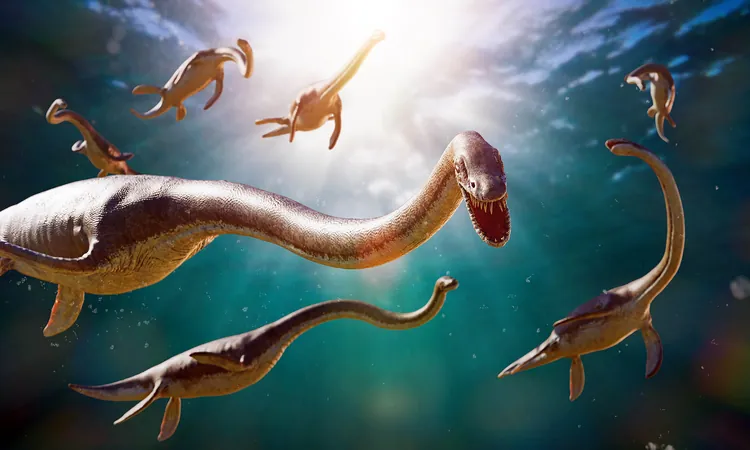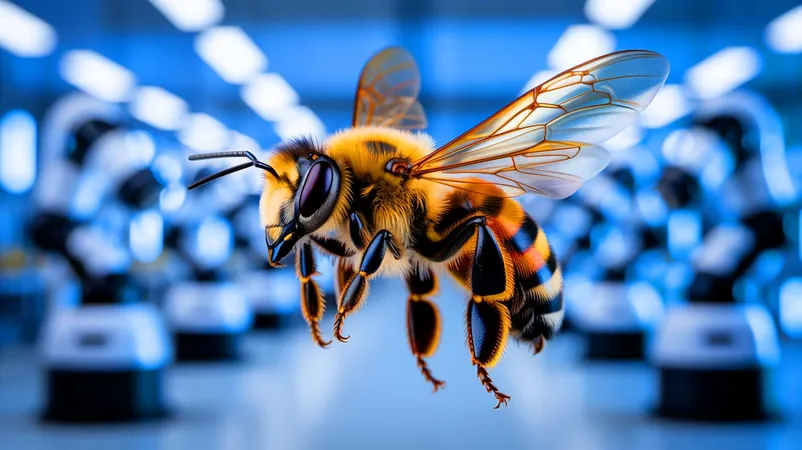
Prehistoric Ocean Giants: The Terrifying Predators That Feasted on Killer Whales!
2025-01-19
Author: Yan
In a groundbreaking study, scientists have unveiled that our oceans once harbored colossal marine reptiles that eclipsed modern killer whales in both size and ferocity. This astonishing discovery, centered on the central region of Colombia, reveals that these ancient predators dominated their aquatic environments, offering a thrilling glimpse into a prehistoric world.
A Deeper Dive into the Ancient Food Chain
Paleontologists have reconstructed the marine ecosystem from approximately 130 million years ago, unveiling a vibrant web of life that challenges our current understanding of oceanic food chains. Modern killer whales and great white sharks typically rank around the sixth level in today's food webs, but these prehistoric marine reptiles operated at a staggering seventh level—asserting their dominance in a way that suggests they could have snacked on killer whales without breaking a sweat!
Led by Dirley Cortés from McGill University’s Department of Biology, this research dissects the complex relationships within the ancient ecosystem, showcasing how large predators like these reptiles could exceed lengths of 33 feet (10 meters) and possessed robust predatory skills.
A Harsh Environment Sparks Evolution
The dynamics of ocean life during the Mesozoic Era were anything but stable. Competition for resources was fierce, forcing predators to evolve unique strategies and formidable physical traits. The phenomenon known as the Mesozoic Marine Revolution saw the rise of shell-crushing snails and a myriad of predatory invertebrates, hinting at an environment ripe with evolutionary pressure.
Cortés emphasizes the importance of these findings: “Our study opens up new avenues to explore how competition has shaped marine biodiversity over eons.” The researchers utilized fossil remains from the Paja Formation to underline the extraordinary adaptations that enabled these reptiles to climb the trophic ladder.
The Bigger Picture: Understanding Modern Ecosystems
The implications of this research extend beyond simple fossil cataloging. By digging into ancient ecosystems, scientists hope to draw parallels with today’s marine environments, providing insights into resilience against climate change and habitat disruption. As we face declining biodiversity, understanding the past helps us mitigate future challenges.
Larsson notes, "These discoveries reinforce the idea that apex predators play a crucial role in shaping their ecosystems, often fostering biodiversity by creating opportunities for various species."
Uncovering New Mysteries
As researchers continue their explorations, the quest to understand marine reptiles and their ecosystems is far from over. There's a tantalizing possibility that other fossil sites, previously overlooked, may harbor evidence of similar seventh-level predators. This ongoing research may rewrite our understanding of marine life's evolutionary history and the incredible adaptations that have taken shape over millions of years.
In conclusion, the world of prehistoric marine reptiles not only captivates the imagination but also serves as a crucial touchstone for understanding resilience and diversity in the face of ecological upheaval. The legacy of these ancient giants continues to echo through time, reminding us of the enigmatic and fierce life that once ruled our oceans.
Prepare to be amazed by how the past can dramatically inform our future! For more incredible insights, subscribe to our newsletter for exclusive content and updates!


 Brasil (PT)
Brasil (PT)
 Canada (EN)
Canada (EN)
 Chile (ES)
Chile (ES)
 Česko (CS)
Česko (CS)
 대한민국 (KO)
대한민국 (KO)
 España (ES)
España (ES)
 France (FR)
France (FR)
 Hong Kong (EN)
Hong Kong (EN)
 Italia (IT)
Italia (IT)
 日本 (JA)
日本 (JA)
 Magyarország (HU)
Magyarország (HU)
 Norge (NO)
Norge (NO)
 Polska (PL)
Polska (PL)
 Schweiz (DE)
Schweiz (DE)
 Singapore (EN)
Singapore (EN)
 Sverige (SV)
Sverige (SV)
 Suomi (FI)
Suomi (FI)
 Türkiye (TR)
Türkiye (TR)
 الإمارات العربية المتحدة (AR)
الإمارات العربية المتحدة (AR)